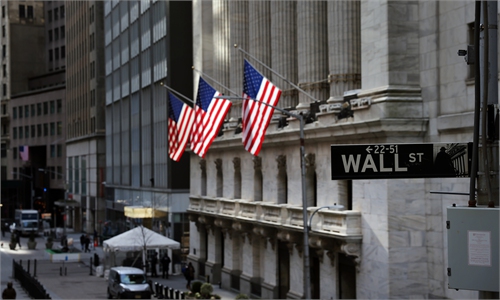COMMENTS / EXPERT ASSESSMENT
Chinese companies turn table on US’ financial decoupling push

Illustration: Tang Tengfei/GT
Jim Cramer, the famed financial commentator on the US business news network CNBC who usually has plenty of recommendations for stock picks even during periods of financial crisis (He once said Bear Stearns was in good shape right before it imploded in 2008), appears to be running out of recommendations when it comes Chinese stocks.
During a program on Wednesday, Cramer said it was "impossible" for him to recommend Chines stocks for investors, even though he believes China's middle class will "do better" and Chinese tech giants Alibaba, JD and Baidu would "do well." He alleged the Chinese government for creating a "total wild card."
Cramer's apparent frustration is not rare in Wall Street these days, as US investors are struggling to cope with the uncertainties surrounding US-listed Chinese stocks, which, as Cramer suggested, have great growth potential, but face growing political risks.
What Cramer and others get wrong is that the uncertainties and risks come from Washington, not Beijing. What they are grappling with is the result of the US government's multi-year crackdown against Chinese tech companies through measures such as delisting and blacklisting. Simply put, Washington's push for a financial decoupling from China is happening and could further accelerate in coming months and years, if US officials were to get their way.
Under the US' crackdown, many US-listed Chinese companies have moved or are in the process of withdrawing from US markets. On Wednesday, China Mobile, which was delisted from the US stock market last year, recorded a bumper debut on the Shanghai Stock Exchange. Last week, Chinese artificial intelligence firm SenseTime, which has recently been blacklisted by the US, made its debut on the Hong Kong Stock Exchange, with its share prices soaring as much as 23 percent on its first day of trading. In December, Chinese ride-hailing app Didi said it would delist from New York Stock Exchange and opt instead to list in Hong Kong.
That's just to name a few of the growing list of Chinese companies returning to domestic markets. And there could be more to come. Also on Wednesday, China National Offshore Oil Corporation (CNOOC), which was pushed out of the New York Stock Exchange in October, announced that it will terminate its American depositary share program on February 3, 2022 and will pursue a listing in Hong Kong.
The home-coming of Chinese tech giants have been widely welcomed by investors on the mainland and in Hong Kong, in stark contrast to the growing frustrations among Wall Street investors like Cramer. That contrast lays bare the US' government push for a financial decoupling from China is not going as it intended, instead, it has backfired.
Washington's apparent intention was to punish Chinese tech firms in its broad attempt to contain China's technology rise, but that evidently did not take down those companies or slow down China's technological development. One could even argue that the crackdown actually bolster the Chinese companies and in the long term, China's capital market and technological development. For proof, look no further than the enthusiasm among Chinese and also foreign investors over the home-coming of these stocks both on the mainland and Hong Kong bourses.
Alongside the return of Chinese tech giants is the growing list of global financial institutions, including those from the US, seeking license to operate in the Chinese capital market. US investment firms JPMorgan, Morgan Stanley, Goldman Sachs and Citigroup have all been granted or applied for securities business permits in the Chinese mainland.
The US crackdown, as many had repeatedly warned before, has only hurt individual US investors. For proof, just listen to Cramer's frustration. What the US government crackdown has done is, instead of depriving Chinese tech firms of capital, actually depriving US investors of sound investment options, especially during a time when US stocks are grossly overpriced. Indeed, Chinese tech companies are facing tightening regulations in China, but efforts to root out monopolistic and other illegal practices would only help these firms grow sustainably, not crush them.
How China turned the tables on the US? Simply speaking, China's ability to cope with emerging risks and carry out reforms effectively to ensure the smooth home-coming of the firms and the resilience of the Chinese economy and Chinese tech companies - or, as Cramer puts it, a middle class that will "do better" and Chinese firms that will "do well." These are factors that will continue to help China beat back US' crackdowns and turn the tables on the US, just as it did on the US tariff war and its financial decoupling campaign.
The author is an editor at the Global Times. bizopinion@globaltimes.com.cn



